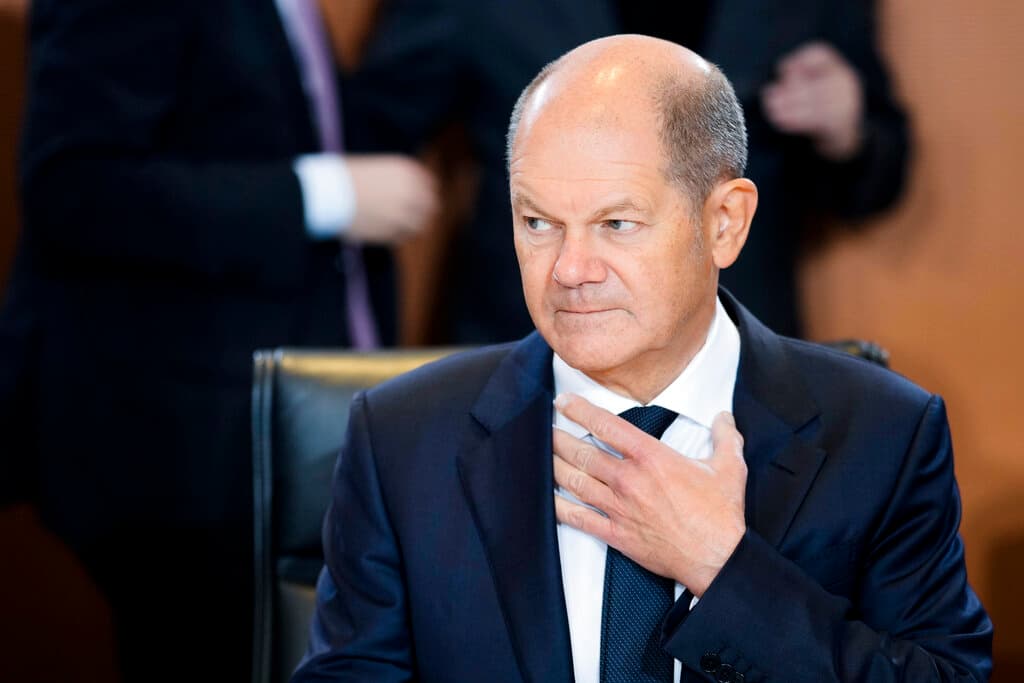Germany’s Scholz Secretly Hopes for a Trump Win, New Report Suggests, as Walls Quietly Close In on the AfD
Berlin keeps a gimlet eye on the American election as German domestic political upheaval swirls in unpredictable ways.

When it comes to politics, today’s Germany is a lot like Canada — pretty vanilla as a rule, but watch out for those zesty exceptions. In recent days, Germans have clogged the streets of Berlin, Munich, and other cities to protest the rising right-wing Alternative for Germany party, which has been surging in the polls.
Germany’s chancellor, Olaf Scholz, has been keeping tabs on the AfD even as he’s got a gimlet eye on the American election and the Republican frontrunner, President Trump. The connections between the two are varied but hardly surprising, considering how much American foreign policies affect those of the major European powers like Germany.
In the case of Herr Scholz, they are even contradictory: Why would a scion of the center-left Social Democratic Party be rooting for a second term for an American leader who is many things, but center-left isn’t among them? According to the German newspaper Bild, Herr Scholz’s SPD party has been “shaken by lousy polls and party resignations.”
This is giving the sauerkraut socialist cause to seek to unify his supporters by rallying them against xenophobia and the AfD, which is seen as epitomizing that tendency. A Trump victory would also lend fuel to Herr Scholz’s effort to consolidate power ahead of German federal elections next year because the chancellor could present himself as Europe’s “savior” against a President Trump who is thought by some to “want to defend Europe less and less.”
The German defense minister and fellow SPD stalwart, Boris Pistorius (no relation to the South African Pistorius), could also jump on that bandwagon, were it to become such a vehicle. The reason is that Mr. Trump’s intended course when it comes to issues like funding for NATO and aid for Ukraine are, despite some appearances to the contrary, not entirely clear.
Germany is a linchpin in the EU’s efforts to support Ukraine, but unlike in Britain that support has been less than unequivocal. Only last week, a majority in the Bundestag voted against supplying Ukraine with Taurus cruise missiles. Whatever the reasons for that rejection, it is likely music to the ears of the AfD, which has taken a stance on Ukraine more in alignment with that of Hungary’s Viktor Orban than with that of Paris and London.
It is on issues like Ukraine that the AfD is likely to gain more traction ahead of European parliamentary elections in June. The party’s co-chairman, Alice Weidel, remarks in praise of Brexit and evocation of a referendum on Germany’s membership in the EU are intriguing but less relevant than an issue that is right now hitting more Germans where they don’t like to be hit: in their pocketbooks.
The AfD claims to be the “only political force in Germany that presents concrete measures for a diplomatic solution to the conflict” in Ukraine, and it has floated a proposal to end the war — no doubt an overly optimistic undertaking right now.
It is not that Germany cannot afford the nearly $8 billion it has sent Ukraine over the past two years. Like some European leaders — not only Mr. Orban — and at least one prominent Republican senator, members of the party’s parliamentary group warn of the risk of escalation, with all the financial and military fallout that might entail.
For now, though, despite some Germanic qualms vis-à-vis the direction of the war in Ukraine, the AfD is likely to remain an outlier. For one thing, Germany’s domestic spy agency has likely already placed under surveillance certain members of a party still perceived by some as extremist.
In a roundabout way, that means Berlin is laying the groundwork for what could be the ultimate goal of suppressing the party altogether, and there is precedent within the EU — last year, Greece banned the far-right Golden Dawn party from elections altogether.
Meantime, over the weekend Germany’s WerteUnion, or Union of Values, a group consisting mainly of members of the center-right Christian Democratic Union, voted to form a new conservative party. The WerteUnion in its original form was founded in 2017 by members of the CDU unhappy with the centrist politics of the former CDU chancellor, Angela Merkel.
The revamped party’s immediate goals are modest — chiefly, to participate in upcoming regional votes in three eastern German states. What the new party really hopes to do, though, is capitalize on public anger over the surge in popularity of the AfD.
Already, other European right-leaning parties have distanced themselves from the AfD ahead of the EU’s upcoming parliamentary elections, so now it appears that a cordon sanitaire around the party is developing within Germany as well. Whether that will ultimately fragment support for the AfD is too soon to tell.
It is, though, worth noting that Mr. Trump once warned Ms. Merkel about relying too heavily on cheap Russian energy, calling Berlin a “captive to Russia.” If past is prologue, particularly in Europe, Germans across the political spectrum might want to lean in a bit more to what Mr. Trump has to say.

